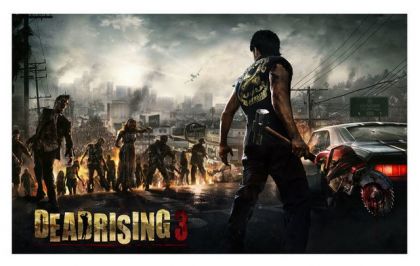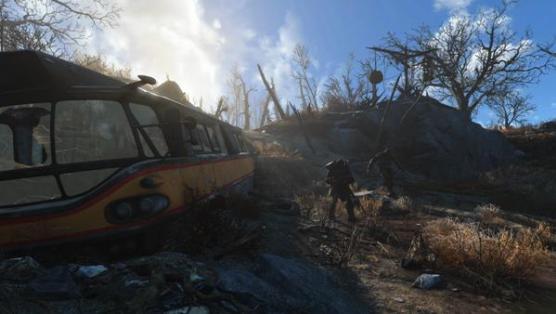

Ever since Ubisoft delivered fully on the promise of Assassin’s Creed with the arrival of Ezio Auditore, fans had high hopes for the future. While Ezio starred in two follow-up titles that did little to advance the overarching plot of Desmond Miles’ quest to save mankind, Ubisoft Montreal was working on something greater.
Now Assassin’s Creed 3 has arrived, with more gamers convinced to get on board than for any game in the publisher’s history. But does Assassin’s Creed 3 deliver the most polished, refined, and ambitious experience in the series, or merely another dose of what fans love?
Ambition is certainly a word that will be thrown around in any discussion of Assassin’s Creed 3‘s most impressive elements; as well as its shortcomings. Not every developer would build a brand new game engine for a game released near the end of a console generation, but that’s just what Ubisoft did – and it shows.
There is no comparison between the fluidity and realism of AC3‘s traversal and combat animations and those of the past. Not just in the recreated parkour acrobatics and sense of momentum evident from the game’s first tutorial, but also the clothing, shadowing, and level of detail placed into colonial New York and Boston.
The improvements set a new visual height for the franchise, even if the art style of Boston and New York can’t hold a candle to Rome or Constantinople’s architecture and thriving bazaars.
Of course, that ambition comes at a cost. The loading times and screens are longer and more numerous than ever before, specifically during story scenes or as bookends to missions. Since the beginning and end of the campaign(s) are largely centered around linear missions and cutscene-laden sequences, the pace is awkward off the bat, and when nearing the game’s conclusion. Luckily, the problem is rarely a factor when taking a break from the main quests.
Ubisoft’s reps have shown quite a bit of pride in the expansion from merely suburban environments of past titles into the American wilderness of colonial America. And all things considered, the addition of hunting, tree-running and changing seasons is a resounding success, particularly for the lack of loading screens or pop-in throughout. The open world isn’t quite as well-realized as say, Skyrim, but is more comparable to games like Red Dead Redemption than previous Assassin titles.
From a technical standpoint, Assassin’s Creed 3 illustrates many of the trade-offs developers are making as the end of this console generation approaches. Visual prowess means a more broken pacing between gameplay and cinematics, but for many, the vastly improved combat and traversal animations and improvisation will be worth the sacrifice. Unfortunately, not every trade-off is as easy to accept or overlook.
The new protagonist Ratohnhake:ton (a.k.a. Connor Kenway) was promised to be the strongest, fastest, and most brutal Assassin players have met, and he delivers. The extended combat animations and increased counter-sensitivity means Connor will be ready to stand his ground and dispatch a squad of enemies when Ezio would have fled. To counter repetition, Ubisoft has equipped Connor with more elaborate and visually satisfying attacks and assassinations.
Connor is even less tied to accepted definition of an ‘assassin’ than Ezio, once again showing Ubisoft’s shift away from stealth towards, for lack of a better term, blockbuster moments. It’s this division of intentions – mission design and story – that the developers attempt to straddle throughout the game, succeeding as often as they fail.
Simply put, Connor is nowhere near as nuanced, well-rounded or likable as Ezio Auditore. Fans had three games to get familiar with Ezio, so perhaps the discrepancy is to be expected. Connor’s mixed parentage may have promised a tortured and devoted soul, or at the very least a protagonist that was unfamiliar in the world of video game storytelling. Unfortunately, that isn’t the case. But it is not completely his fault.
Ubisoft deflected claims of British hatred by stating that Connor’s life wouldn’t be simply ‘an American story,’ and in many ways that’s an accurate assessment. As the half-Mohawk, half-British Assassin bent on revenge states, his enemy is “a notion, not a nation.” given that, it’s difficult to tell exactly why Connor makes the choices and alliances he does. Sometimes adopting the Revolutionary rhetoric of Washington, other times proving it is solely vengeance that drives him.
Ezio Auditore’s first adventure was set against a backdrop of the Renaissance, yet the game was never about that event specifically. For most of AC3‘s campaign, however, the American Revolution and its famous figures are the undeniable stars of the game, not Connor. Instead of rising above those around him, Connor is reacting, most often with violence. He might be capable of dispatching dozens of British soldiers (unless in a cutscene, where he can be bested by one), but in discussing war or leading an army, he is consistently out of his depth.
Without spoiling any of the mysteries of Connor’s parentage, Assassin’s Creed 3‘s first chapters absolutely deliver on the surprise promised by Creative Director Alex Hutchinson, and offer new dynamics that imply a strong finale, but ultimately return to formulaic plotting. It isn’t hard to see why, since Ubisoft was tasked with spending more time on Desmond’s portion of the game than ever before.
After the exposition dump at the end of Revelations revealed who and what had led to the Earth’s impending doom, the writers had quite a lot of answers to provide. And provide them they have, explaining once and for all what Desmond’s role has been all along.
But in regards to the actual idea of the game ‘concluding’ anything, or promises that AC3 wouldn’t end with a cliffhanger, well…let’s just say that the way in which Ubisoft sets up the future of the series (our predictions weren’t far off) will have many asking whether Mass Effect 3‘s ending was such a travesty. We won’t try to spark a similar debate, since more high-quality games are something we’re happy to see. But what ‘closure’ means in a video game franchise is a discussion that might be worth having.
As seems to be the case with ‘final chapters’ in game franchises, the most satisfaction is found in the depth of the campaign, not its conclusion. We could endlessly compliment the naval warfare missions, with visuals and attention to detail so stunning fans will wonder how Ubisoft found room for the addition. The seafaring quests and new base-building elements are vast improvements over the past, immersing the player in Connor’s life in pleasantly surprising ways.
It’s hopefully clear that Assassin’s Creed 3 consists of outstanding components, whose imperfections and disappointments are due to the narrative and presentation designed to unite them. Revelations sacrificed gameplay innovation for story, and AC3 could be said to do the opposite. The combat, recruit implementation, animations, graphics, naval missions and base-building are better than ever before, but when constricted to resemble the story being told, not the other way around, serious problems arise.
The writers show enough sides of Connor’s personality to prove that he could offer something new, but is ultimately overshadowed by one of America’s most oft-explored historical periods. The need to balance two plots explains the somewhat underwhelming drama and morality of the experience, and the final scenes Ubisoft has cooked up for Desmond, Juno, and others could impact the fan excitement for Assassin’s Creed 4.
The characters and story (almost completely devoid of racism aside from mission set-ups) may not have been what we’d hoped they would be, or what was optimistically described by the developers, but that isn’t the final word. Once the campaign has drawn to a close, players will be more motivated than ever to jump back in to the game world and lose themselves in the naval campaign, side missions, not to mention the multiplayer.
Ubisoft may not have topped all their previous efforts with Assassin’s Creed 3, but they have succeeded in delivering the best-looking, most fully-featured overall world to date. The story may sour some longtime fans, but the effort and ambition that the studio has shown from a technical standpoint may show enough promise for what’s to come to keep players invested.
Assassin’s Creed 3 is available now for the PS3 and Xbox 360. A PC release is scheduled for November 20, with a Wii U version coming November 18.
–
Follow me on Twitter @andrew_dyce.



